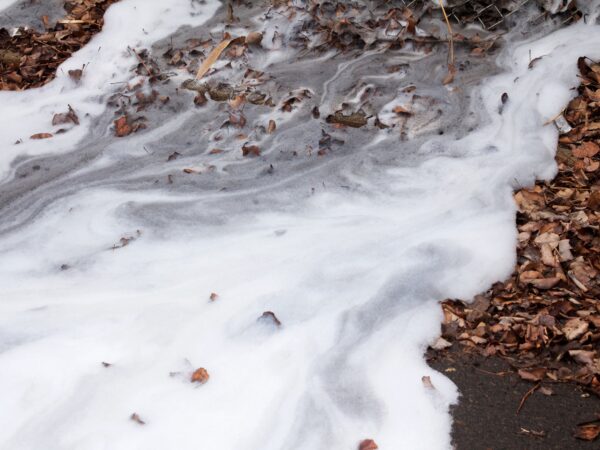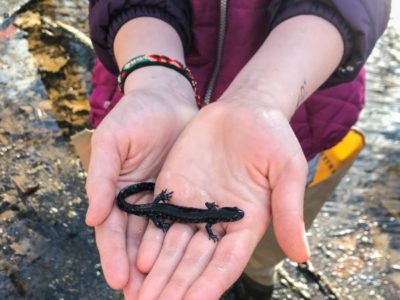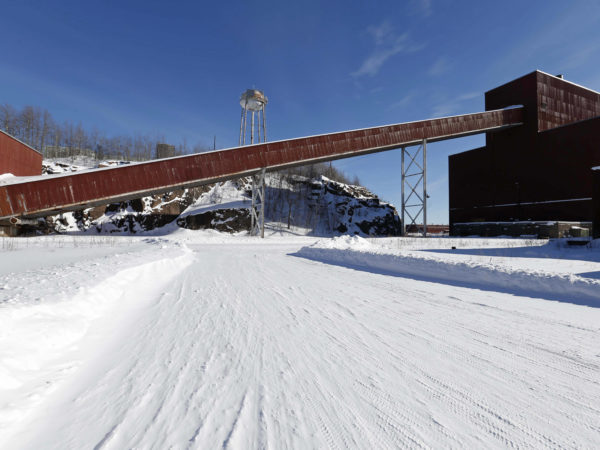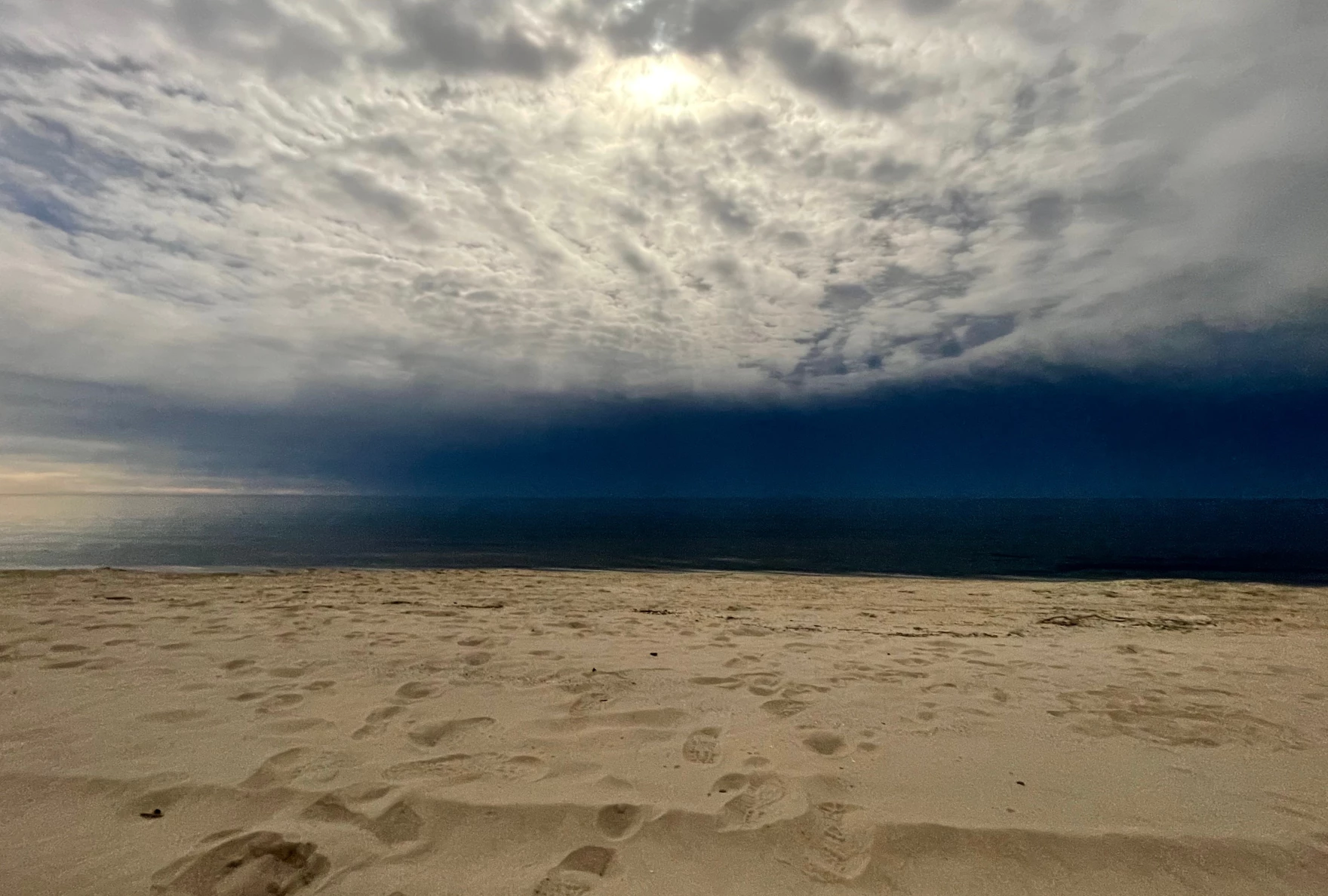
Points North is a biweekly podcast about the land, water and inhabitants of the Great Lakes.
This episode was shared here with permission from Interlochen Public Radio.
Meghan Hetfield and Roni Pillischer drove across New York to witness their first total solar eclipse on April 8, 2024.
“I lost sleep over this,” Meghan said. “I was determined to be in the center of the path to have that experience.
They ended up at Lake Ontario at Black Pond Wildlife Management Area in Henderson, New York. They set up their chairs on the beach and ate a picnic lunch. And then the eclipse happened, with the moon passing directly between the sun and the earth
“It was like the first time I ever felt like I was in space,” says Megan, “like I’m literally a part of this universe, you know, in space.”
It was an intense and beautiful experience. But while it was happening, something else kept grabbing their attention too. They couldn’t help but notice something funny about the sand: it squeaked when people walked on it.
“I was speechless,” said Roni. “I could not stop listening to everybody.”
They wanted to know, “How is this happening?” So, Meghan and Roni turned to Points North for answers.
CREDITS:
Host / Producer: Dan Wanschura
Editor: Morgan Springer
Additional Editing: Ellie Katz, Michael Livingston
Special Thanks: Dr. Melany Hunt
Music: Blue Dot Sessions
Additional Sound: TRP, BudJillett, earthsounds
TRANSCRIPT:
DAN WANSCHURA, BYLINE: Meghan Hetfield had never seen a solar eclipse before. So, when she had the chance last April, she started doing her research. And take note, dear listener…
MEGHAN HETFIELD: I started listening to a bunch of podcasts, which is what I do when I want to learn more about something.
WANSCHURA: One of the things Meghan learned when she listened to those podcasts was being in the exact path of the eclipse was a big deal. Ninety-nine percent totality wasn’t going to cut it.
HETFIELD: No, that’s not enough. Like, that’s the difference between literally night and day.
WANSCHURA: Meghan lives in the Hudson Valley region of New York with Roni Pillischer.
RONI PILLISCHER: Roni Pillischer. I’m Megan’s partner.
WANSCHURA: And so the two of them started planning for this big moment together.
HETFIELD: I lost sleep over this. I mean I was determined to be in the center of the path to have that experience.
WANSCHURA: They try to pinpoint the exact path of the eclipse, they look at weather forecasts, and all these different locations. And then the day arrives: April 8, 2024. Meghan and Roni end up driving to this spot on the other side of the state.
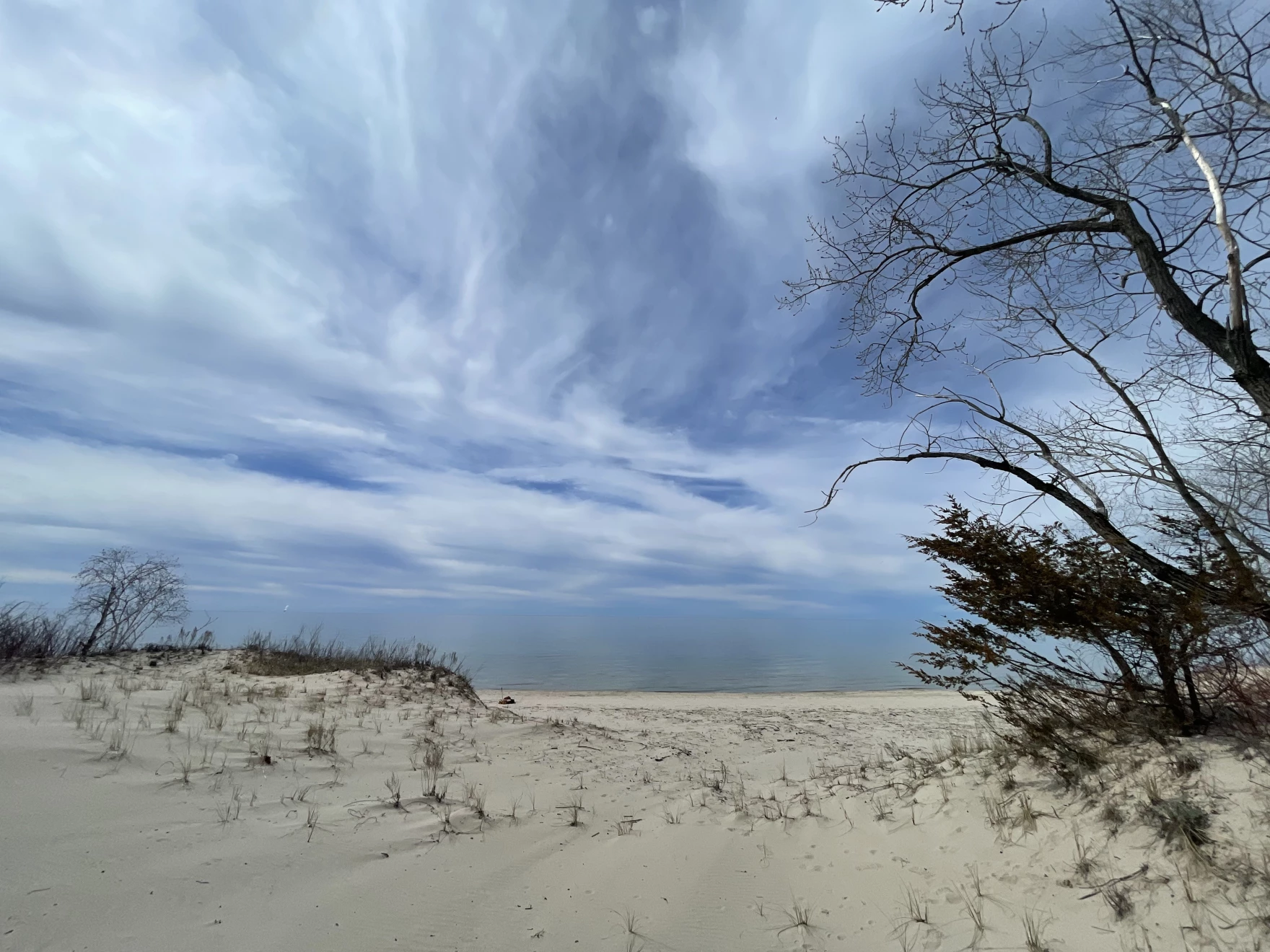
A view of Lake Ontario from Black Pond Wildlife Management Area in Henderson, New York. (credit: Meghan Hetfield / Roni Pillischer)
HETFIELD: Black Pond Wildlife Management Area in Henderson, New York, on Lake Ontario.
WANSCHURA: They walk down a boardwalk to this beautiful beach.
HETFIELD: I immediately felt like I was looking at an ocean. … I couldn’t see the end of it.
WANSCHURA: It’s Meghan’s first time seeing a Great Lake, by the way.
HETFIELD: Ok, is it Ontario or Ontario? We’ve been fighting about this.
PILLISCHER: It’s Ontario.
WANSCHURA: They get there early so they set up some chairs, eat a little picnic lunch and then at 3:22 in the afternoon…
HETFIELD: Boom! There it is. Like it clears all around.
WANSCHURA: The moon passes between the sun and the earth.
HETFIELD: It’s amaz– oh my God!
PILLISCHER: I knew it!
HETFIELD: There was a sunset on both sides because, you know, the way the totality was coming and the temperature changed and then the seagulls went totally silent. And then you started to hear the songbirds that come out like right before sundown and then the frogs like the peepers came out and the temperature dropped.
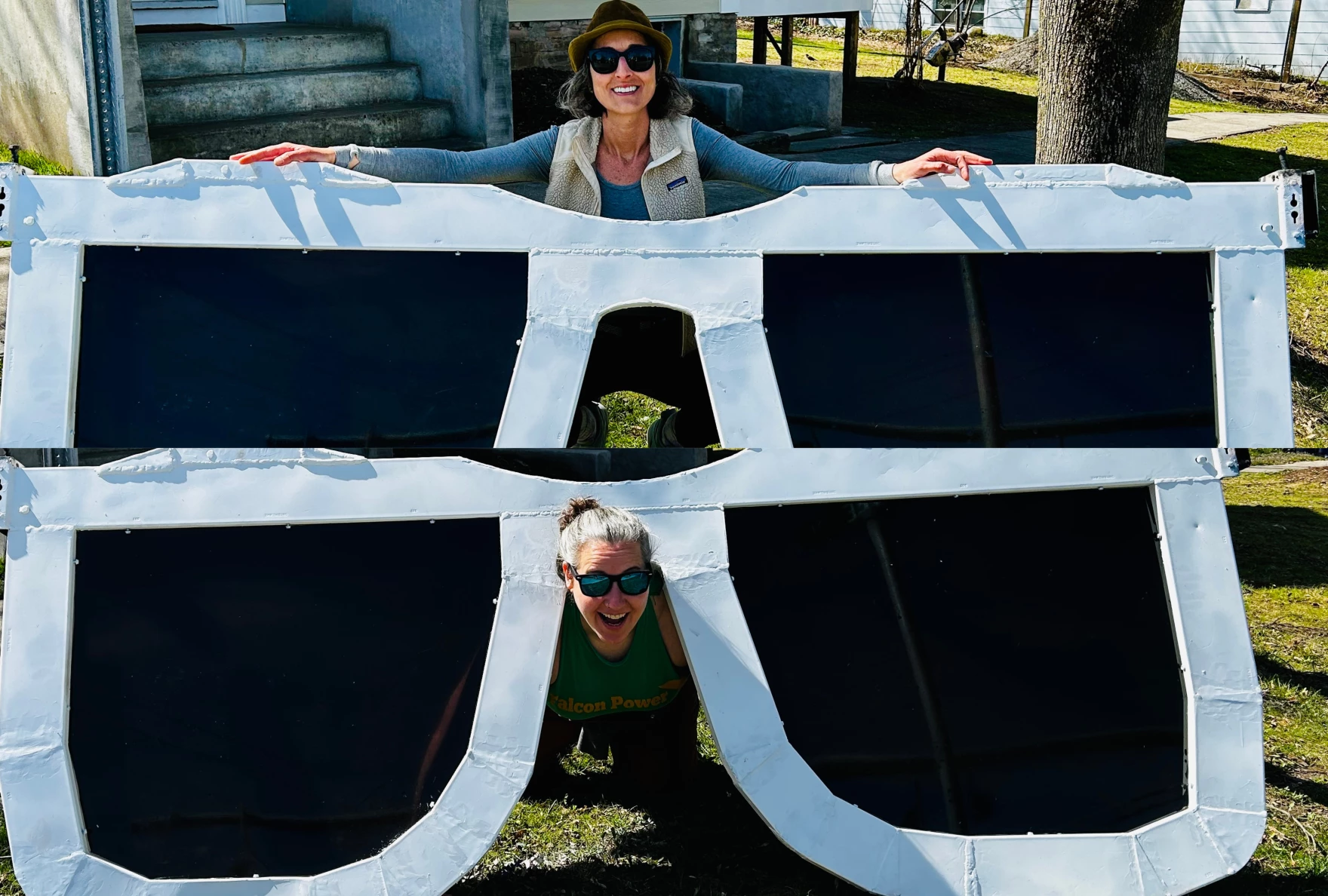
Meghan Hetfield (above) and Roni Pillischer (below) pose with giant “solar eclipse” sunglasses. (credit: Meghan Hetfield / Roni Pillischer)
HETFIELD: Oh my God!
PILISCHER: Oh my God! Oh my God!
HETFIELD: It was like the first time I ever felt like I was in space, like I’m literally a part of this, like, universe, you know, in space.
WANSCHURA: And for three minutes and 41 seconds, they sit there just taking it in.
HETFIELD: It was a very, very intense, beautiful experience. And then there was the sand.
WANSCHURA: The sand. That’s what this story is about. Sure, the wonder and awe of witnessing a total solar eclipse was amazing, but they couldn’t stop thinking about the sand on this Lake Ontario beach.
RONI PILLISCHER: I was so intrigued. Mostly because I edit footsteps for a living.
WANSCHURA: Roni’s a foley editor. She designs and records sounds for TV and film.
PILLISCHER: I was speechless. … I could not stop listening to everybody.
HETFIELD: You know those memes or whatever, or videos where people make a strange sound paired with another thing? That’s almost what it felt like, like somebody was like playing a prank on everyone. Just like playing the wrong sound for the way your feet hit.
PILLISCHER: Oh yeah, yeah. For sure, for sure.
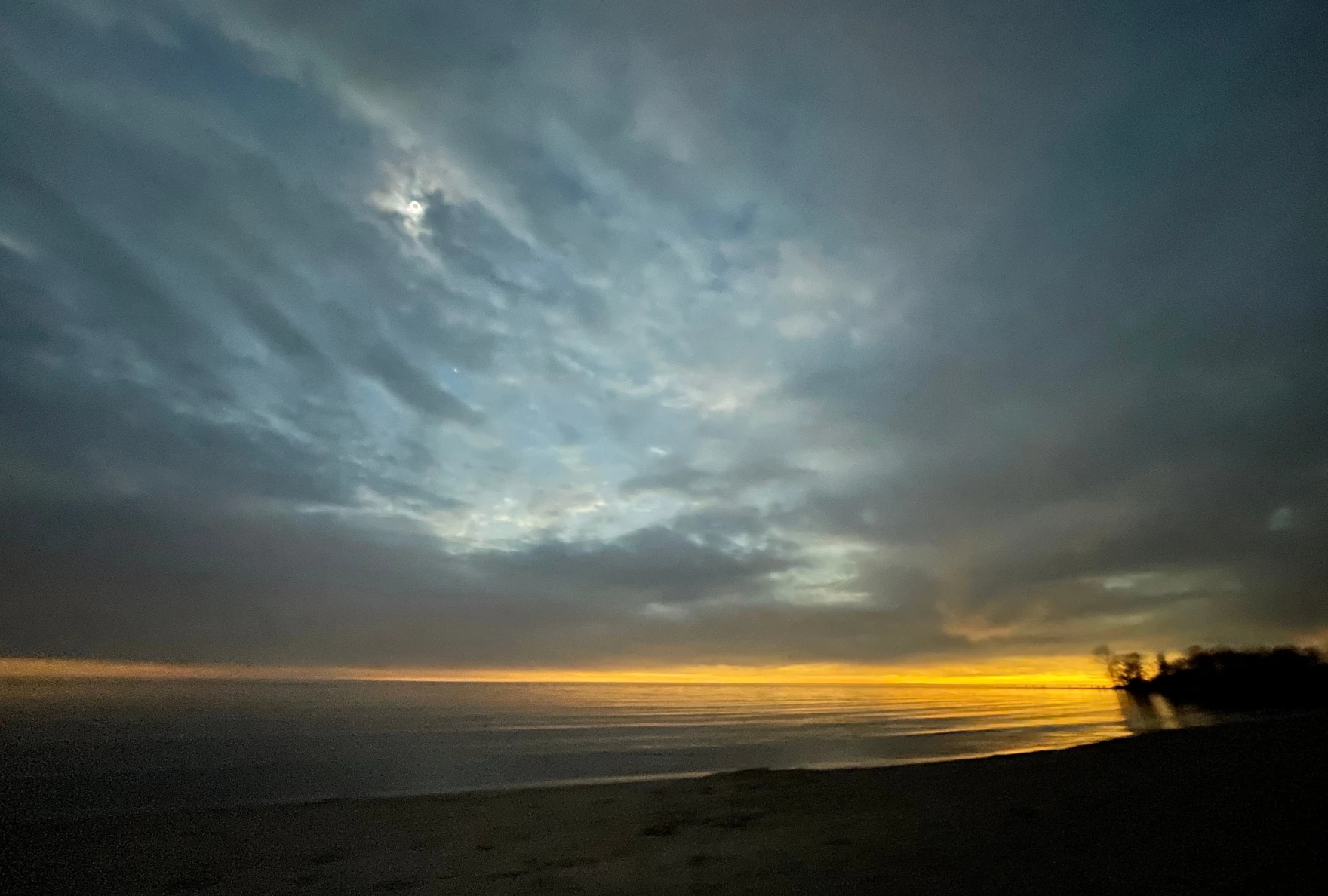
Meghan Hetfield and Roni Pillischer witnessed a solar eclipse on April 8, 2024 at Black Pond Wildlife Management Area in Henderson, New York on Lake Ontario. It blew their mind, but so did something else. They left wondering why the sand squeaked when they walked on it. (credit: Meghan Hetfield / Roni Pillischer)
WANSCHURA: Can you try to make the sound?
PILLISCHER: Oh, okay, let me see. You might need to give me like two or three chances. (noise) No, that’s too wet. (noise) No … I can’t do it.
HETFIELD: Yeah. To me. It was like a honk. It was like a (noise).
PILLISCHER: Yeah, it was closer to that. Yeah, like (noise).
WANSCHURA: Roni says any time somebody walked by they couldn’t stop listening.
PILLISCHER: Just like, how is this happening?
WANSCHURA: So, they reached out to us.
HETFIELD: I mean if it was like magic fairy dust to end world hunger and cure cancer and bring peace and love to the universe, that would be pretty rad.
WANSCHURA: Ok, well, I’m gonna do my best to figure out what’s going on here, you guys, and I’ll report back to you.
PILLISCHER: Oh yeah, cannot wait, man. Thank you so much.
WANSCHURA: And tell me again why you thought of us to answer this question?
HETFIELD: Oh my gosh, I just love all the stories that you tell. There’s skipping rocks.
PILLISCHER: Oh, love that one. Oh, yeah.
HETFIELD: Just some wholesome, beautiful, interesting stories about people all the way to the really dramatic, more intense environmental stories or rescues. And, so this to me, was like the perfect mystery for one of my favorite shows.
WANSCHURA: And that is a perfect segue for me to say, this is Points North. A podcast about the land, water, and inhabitants of the Great Lakes. I’m Dan Wanschura. Today on the show, why some of your favorite beaches might squeak when you walk on them. That’s coming up right after this.
(sponsor messages)
WANSCHURA: Luckily for me, Roni took a video of Meghan walking on the squeaky sand on this Lake Ontario beach.
(video recording of sounds)
PILLISCHER: Just walk. Yeah, just walk.
(video recording of sounds)
PILLISCHER: Is that how you walk?
(video recording of sounds)
WANSCHURA: I played that video for my go-to guy when it comes to questions like this.
WANSCHURA: So, you can pretty clearly hear some squeaking going on there, Guy.
GUY MEADOWS: Yeah.
WANSCHURA: Guy Meadows is the founding director of the Great Lakes Research Center at Michigan Technological University.
GUY MEADOWS: So, I was going to say have her come to Lake Michigan and walk on the beach; it squeaks all the time.
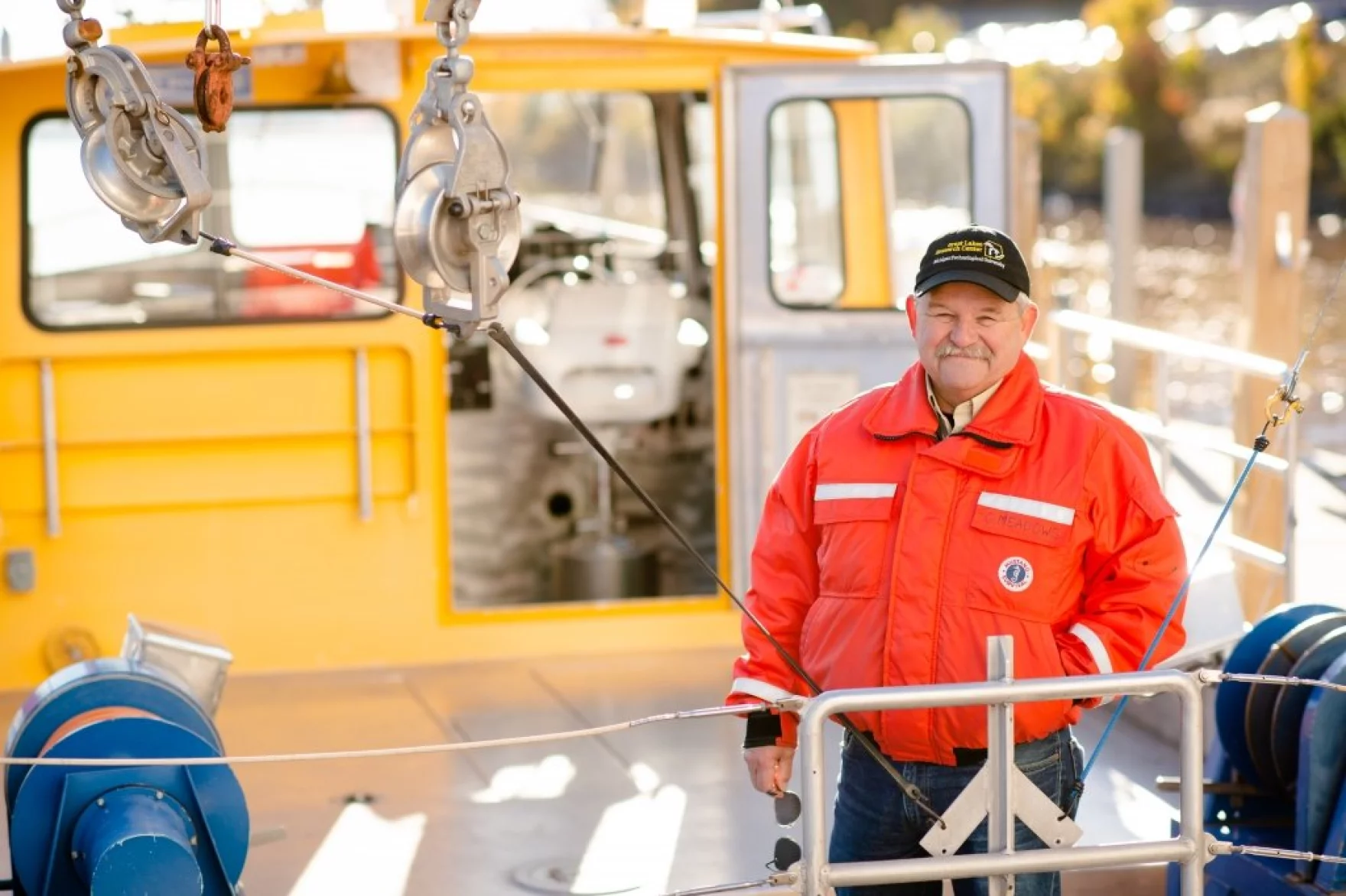
Guy Meadows is the founding director of the Great Lakes Research Center at Michigan Technological University. (credit: MTU)
WANSCHURA: Turns out there are a bunch of different things that cause sand to squeak when you walk on it. I’m just gonna talk about four of them. Thing one: what the sand is actually made of. A lot of Great Lakes beaches are made from quartz, feldspar and limestone.
MEADOWS: You know, they’re hard minerals. Same fine material down in the Florida beaches don’t squeak because it’s ground up shells and things like that. It’s not– the beaches [are] not built of the same material.
Thing two: the size and shape of the sand grains. They gotta be round and about the same size. Otherwise the little sand grains would basically just settle in the gaps between the bigger sand grains. And they wouldn’t rub against each other in the same squeaky way. Thing three: moisture – how wet the sand is.
WANSCHURA: Is what you’re saying like it needs to be totally dry or it just can’t be too wet.
MEADOWS: Can’t be too wet.
WANSCHURA: Gotcha. So there’s gotta be a little bit of moisture, but it can’t be too wet because then otherwise it’s like a slurry basically.
MEADOWS: Goldilocks, right?
WANSCHURA: (laughing) Yes. Yes. Just right.
MEADOWS: Gotta be just right.
WANSCHURA: So those three reasons – other researchers have pointed to them too. But the fourth thing is really more of a theory. Guy Meadows’ theory for why this particular sand on this particular beach on Lake Ontario was squeaky. And it’s my favorite part.
Water levels were really high across the Great Lakes back in 2019 and 2020. They were breaking all sorts of records. Because of that, a lot of beaches went through this natural process of erosion. Beaches got really small as the lakes rose and pulled all the sand into the water. But once water levels dropped down again, that sand got pushed back up on shore.
MEADOWS: So, it’s been recently put there, and it’s not compacted and stuff as much as an older beach would be. And it squeaks.
Another way of saying that is, since it’s kind of got air in it and everything else, and it’s fluffier – it’s hard to think of sand as fluffier – but fluffier. It’s in the process of settling itself back down. So naturally the grains are going to rub against each other as they’re compacted.
WANSCHURA: Are you saying that this beach may not have been squeaky before the high water levels?
MEADOWS: It was probably less squeaky because it had been longer compacted.
WANSCHURA: Oh that’s really interesting. … This was fun. I had no idea it was related to erosion and all of that. Yeah, it’s cool.
MEADOWS: It’s good to hear from you, so.
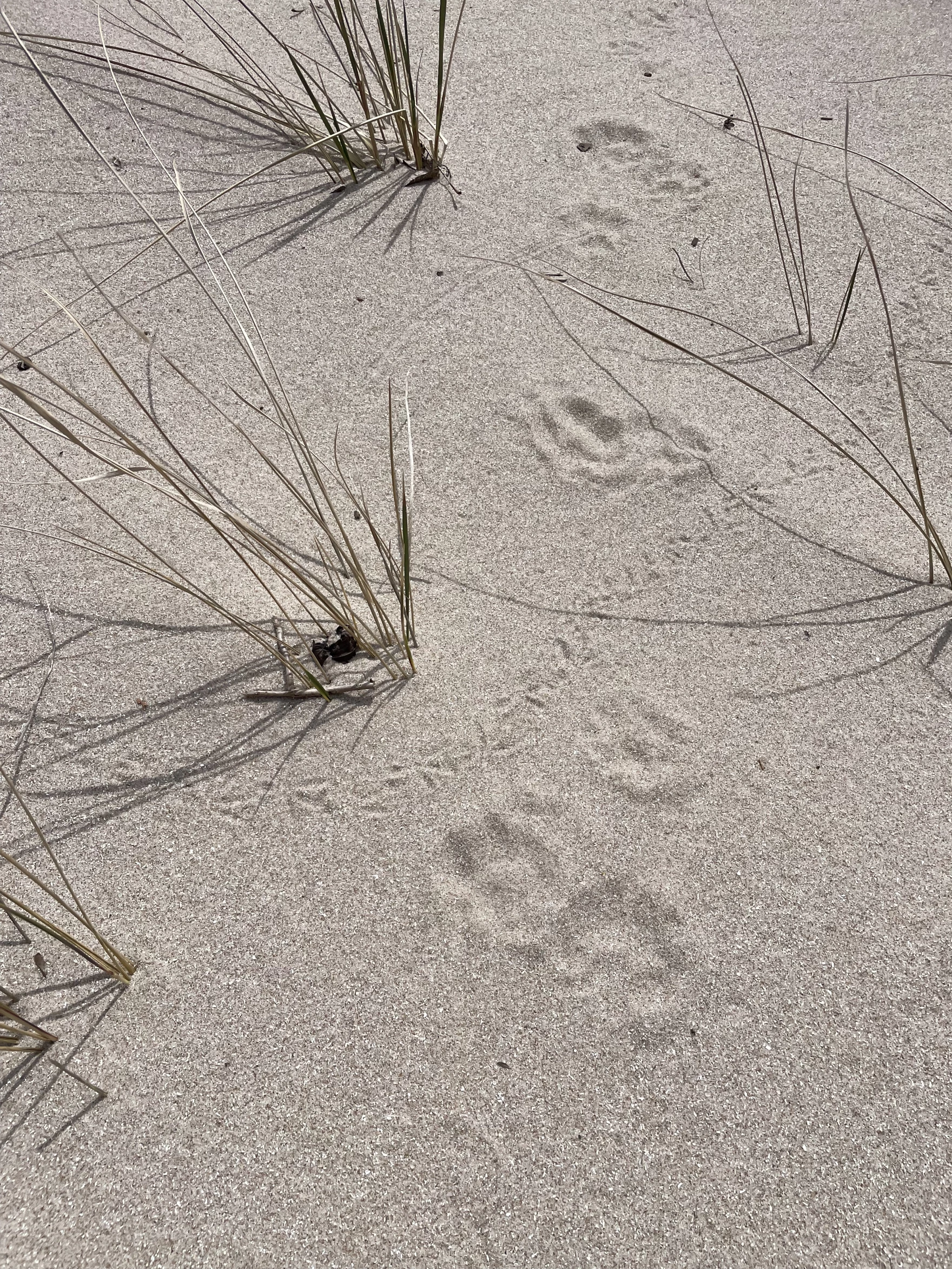
Some animal footprints on the Lake Ontario beach at Black Pond Wildlife Management Area in Henderson, New York on Lake Ontario. (credit: Meghan Hetfield / Roni Pillischer)
WANSCHURA: I’m going to redo the ‘hello,’ okay? So, we have it on- have it on tape. Hello guys!
PILLISCHER: Hey, what’s up?
HETFIELD: How’s it going?
WANSCHURA: Good to see you both again.
WANSCHURA: Time to report back to Meghan and Roni.
WANSCHURA: Have you just been on pins and needles this whole time waiting to hear the answer to the squeaky sand mystery?
PILLISCHER: Oh, literally, literally.
HETFIELD: Yes, you have no idea.
PILLISCHER: I’m so excited to hear this.
WANSCHURA: Okay. So, unfortunately, there’s no magic pixie dust that’s the cause of this. There’s a- there’s a bunch of different reasons that seem to line up…
WANSCHURA: I tell them about all the different things.
WANSCHURA: …So, that is also part of the reason why when you walk on it, it squeaks.
PILLISCHER: All right. So, real quick though, when you started this off, you said, ‘Unfortunately, it’s not magical pixie dust.’ Honestly, Dan, this is like, to me, that is magical. Like the fact that an occurrence that happened a few years ago set us up for an experience years later … I, honestly, dude, like not sure it gets more magical than that.
HETFIELD: I’m inclined to jump in the car right now and go check and see if it’s still squeaking.
Catch more news at Great Lakes Now:
Points North: Complete With His Language
Points North: The Iceman Giveth, The Iceman Taketh
Featured image: The moments leading up to the solar eclipse on April 8, 2024 at the Lake Ontario beach at Black Pond Wildlife Management Area in Henderson, New York. Meghan Hetfield and Roni PIllischer were awestruck by the event, but left wondering why the sand squeaked when they walked on it. (credit: Meghan Hetfield / Roni Pillischer)


